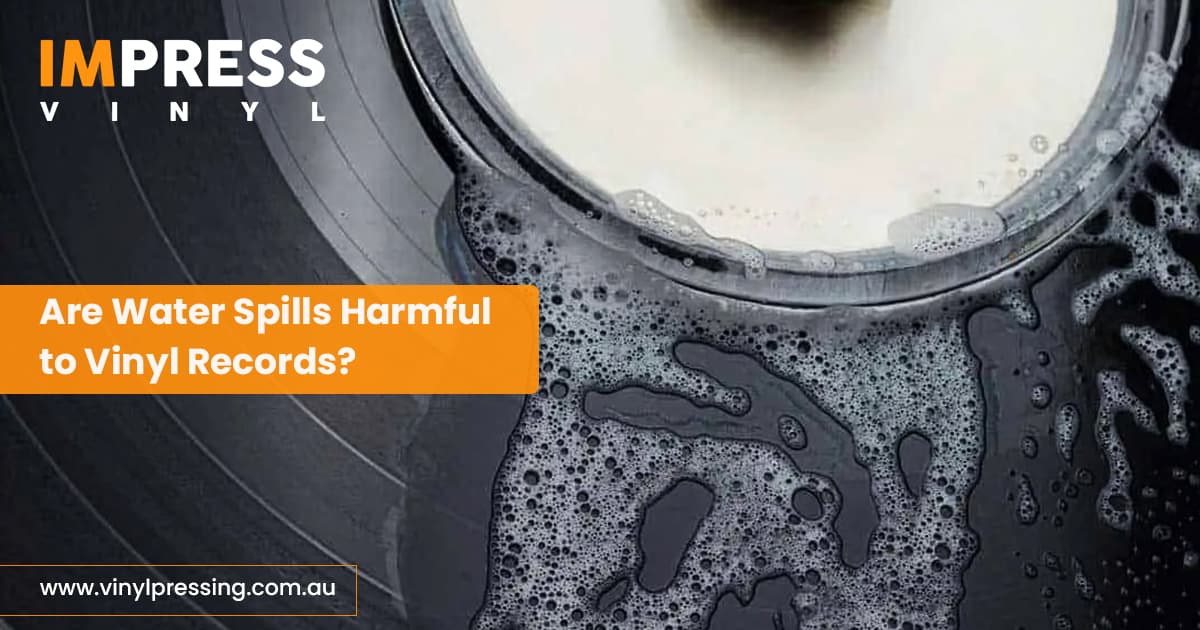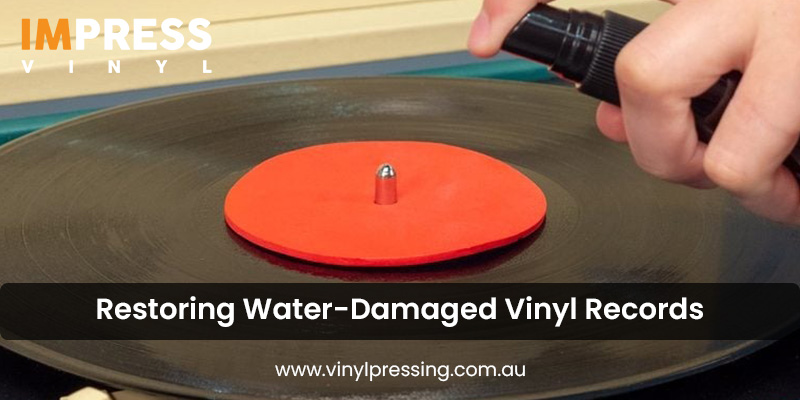Are Water Spills Harmful to Vinyl Records?

Ever wondered about cleaning vinyl records with water rather than a cleaning solution? Is water harmful to vinyl records? What happens if I accidentally spill water on my vinyl record? Are you confused by this kind of question? You’re at the right place. Let’s dive deep into this blog, together to explore some facts about water spills on the vinyl records.
Music lovers cherish the rich nostalgic analog sound of vinyl and indeed vinyl records have experienced a major comeback in recent years. However, with great nostalgia comes great responsibilities and confusion. Let’s find out if water spills are a true nightmare for vinyl record storage.
Myth or Real?
While it is true that water can harm vinyl records, the reality is not as simple as it appears. Vinyl records are significantly more durable than we realize. Vinyl is made by combining ethylene or crude oil with chlorine to create polyvinyl chloride, a strong synthetic material.
Water does not destroy this plastic, as it does most plastics. If a tiny spill is cleaned up quickly, it is unlikely to cause irreparable damage. However, it is preferable to use distilled or deionized water to remove all potential deposits and pollutants from the water.
Prolonged contact with water or any liquid, on the other hand, is unquestionably hazardous. So keep that water bottle away from your record treasure trove! The paper labels in the center of your album are stuck on semi-water-soluble glue. This means that even a drop of water on the label can badly harm it, especially if the water remains on the label.
Impact of Water Damage on Vinyl Records
Water damage on vinyl records has the greatest impact on playability and sound quality. Water can cause warping in the grooves, causing the needle to bounce and skip records. Let’s look at why water spills can be harmful to vinyl records.
Warping
To produce high-quality sound, vinyl records should be kept flat. When a record is exposed to water, it might distort, creating uneven playback and potentially rendering it unplayable. This is because vinyl records are made of PVC, a form of plastic that softens when wet.
Mildew and mold
If water is left on a vinyl record for a lengthy period, mold and mildew can emerge. This not only degrades the record’s appearance but also diminishes its sound quality.
Damage to the groove
Water can carry dirt and particles into a vinyl record’s grooves, causing irreparable damage. As the stylus of your turntable travels down the grooves, it may take up these impurities and produce scratching, resulting in audible distortion.
Label Failure
Water can cause vinyl record labels to peel or bubble, which is ugly and lowers the value of valuable vinyl.
Restoring Water-Damaged Vinyl Records

The water-damaged vinyl record restoration process can be a delicate and time-consuming operation, but it is doable if done swiftly and carefully. Here are some methods you can take to save your water-damaged vinyl records:
-
Pat Dry with a Clean Cloth:
After rinsing, use a clean, lint-free cloth to pat the record dry. Again, use caution to avoid scratching the surface.
-
Air Drying:
Allow the vinyl record to completely dry. Allow it to dry naturally on a clean, dry surface. Avoid exposing the record to direct sunshine or heat, as this can warp it.
-
Clean the Grooves:
To remove any remaining dirt or debris from the grooves, use a professional vinyl record cleaning brush or a carbon fiber brush. Brush along the grooves lightly, following the rotation of the record.
-
Play the Record:
Play the record once it has been dried and cleaned to check for any audible damage. Be prepared for pops, crackles, or skips, as water damage can permanently destroy the grooves.
-
Consider Professional Restoration:
If the damage is serious and the record is not playing properly, you might consider professional restoration services. Some businesses specialize in the restoration of damaged vinyl records, including the removal of scratches and other flaws.
Preventing Water damage
Here are some precautions to prevent vinyl records from water damage.
Storage
To safeguard your records from dust and humidity, use suitable storage units and inner sleeves. Avoid wet basements and leaking attics.
Sleeve Protection
To protect your vinyl records from moisture and dust, invest in high-quality polythene or polyethylene sleeves. These inside sleeves operate as a water and physical harm protection.
Spill Prevention:
When listening to music near drinks or liquids, use caution. To avoid inadvertent spills, make it a rule to keep beverages away from your vinyl setup.
Handling:
Handle your vinyl records with clean, dry hands at all times. As much as possible, avoid touching the grooves or the playing surface.
Immediate Action:
Act soon if a water spill occurs on your vinyl records. Dry the record gently with a lint-free cloth, working in a radial pattern from center to edge. Make certain that no water is trapped in the grooves.
Impress Vinyl: Your Source for Vinyl Records
Impress Vinyl is the premier place for vinyl record collectors in Melbourne. They provide a diverse selection of bespoke vinyl records and vinyl album covers, allowing you to create one-of-a-kind and personalized vinyl experiences. Impress Vinyl has you covered whether you’re a collector or an artist looking to produce your music on vinyl.
Water spills can damage vinyl records, reducing their sound quality, look, and value. You can safeguard your valuable records from water damage by taking steps and carefully preserving your vinyl collection.
Impress Vinyl is the place to go for all of your custom vinyl record and album cover needs. Remember, maintaining your vinyl albums is about appreciating the eternal beauty of analog music in the digital age, not just nostalgia.